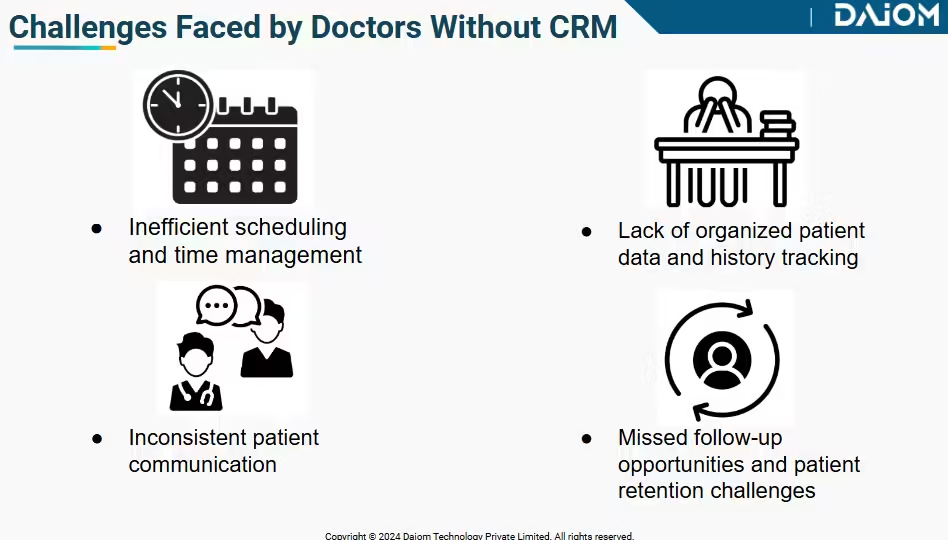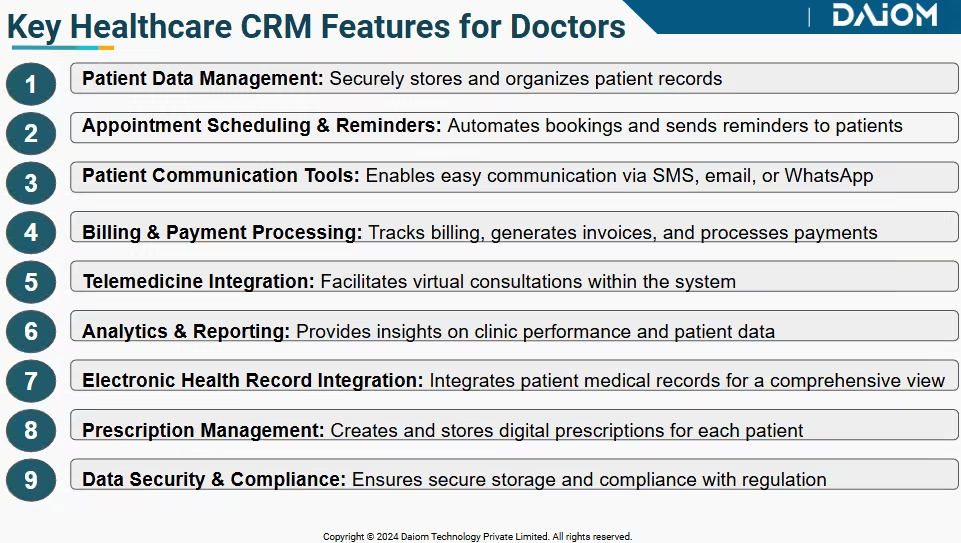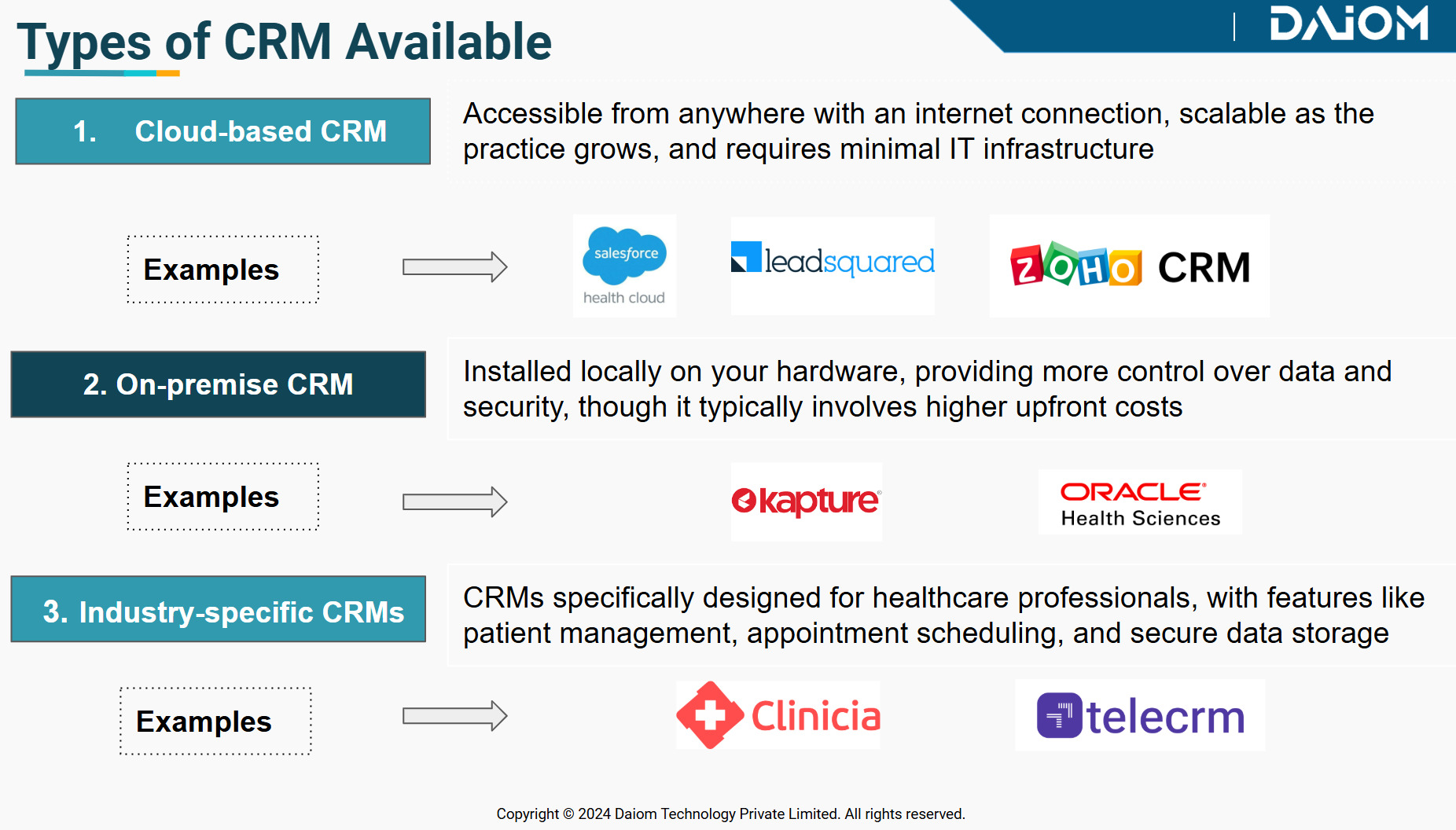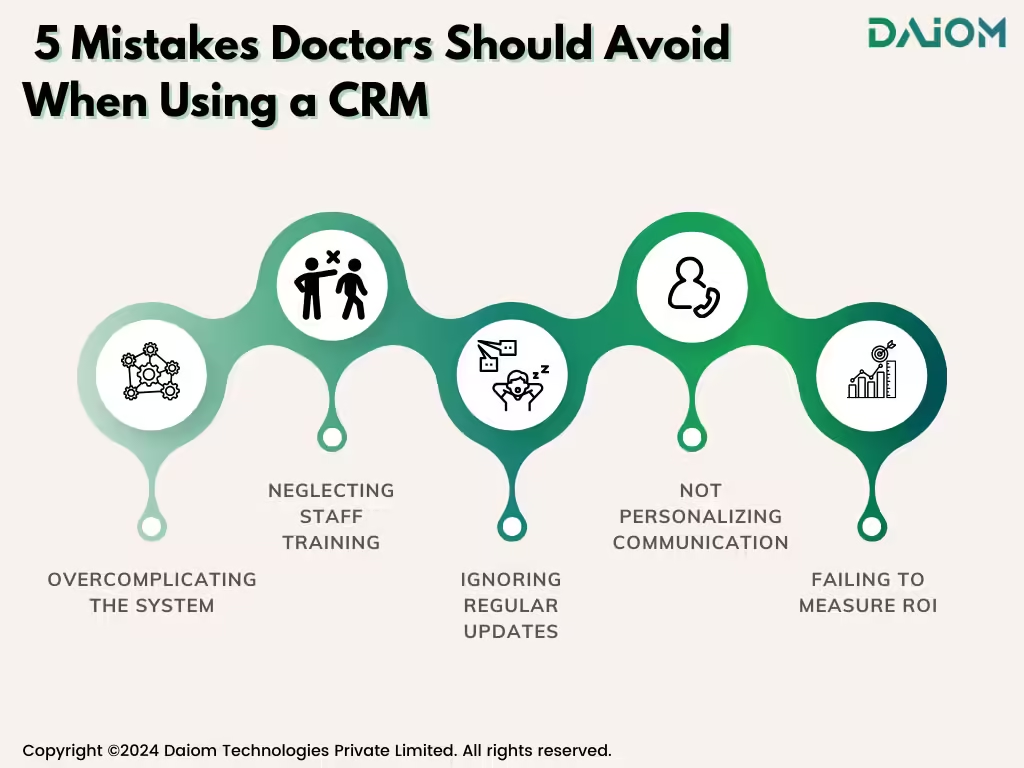Post-COVID, the healthcare landscape in India has transformed dramatically. Doctors now face new challenges and opportunities that demand innovative solutions.
Since COVID, virtual consultations have become common, and more patients expect personalized care and quick responses. This shift has made it harder for doctors to manage appointments, records, and follow-ups.
This is where a Customer Relationship Management (CRM) system steps in.
CRM systems are now a key solution to help doctors handle these challenges. They help improve patient care, keep everything organized, and make clinic operations smoother.
Studies show that over 30% of doctors report spending more than 10 hours a week on administrative tasks—time that could be spent focused on patient care. With so many responsibilities, it’s easy for small details to be overlooked, and even harder to provide the level of personalized care that patients expect.
With a CRM, doctors can stay organized, reduce administrative stress, and engage more effectively with patients.
In India, tools like Practo Ray, Lybrate, MocDoc, Salesforce Health Cloud, and Zoho CRM are designed specifically for healthcare needs. These CRMs offer features such as patient management, telemedicine integration, and analytics, all of which help doctors streamline their practice, enhance patient care, and improve operational efficiency.
Read more – Why Doctors Should Scale Up Their Digital Presence?
Read the blog to know more on why a CRM is essential for modern doctors and how it can simplify their practice.
A CRM is like having a digital assistant that remembers every detail about your patient relationships—appointments, medical history, prescriptions, and even billing.
Table of Contents
1. Why Do Doctors Need a CRM?
Managing a medical practice requires organization, communication, and efficiency to deliver the best care. For doctors, a Customer Relationship Management (CRM) is not just a tech tool; it’s a solution.
It helps streamline patient interactions, automate routine tasks, and provide insights to grow the practice. Here’s why a CRM is essential for modern healthcare professionals:

- Stay Organized: A CRM centralizes all patient information, from medical histories to contact details, into one easy-to-access system. This eliminates the chaos of handling paper files or switching between multiple platforms.
- Improve Patient Communication: Timely and effective communication builds trust. A CRM automates reminders for appointments, follow-ups, and even health tips, keeping patients informed and engaged.
- Saves Time: By automating administrative tasks like scheduling and billing, a CRM allows doctors to dedicate more time to their patients rather than paperwork.
- Improves Patient Satisfaction and Loyalty: Regular communication through personalized messages helps maintain stronger relationships. Patients are more likely to return for follow-ups, ensuring continuity of care.
- Gain Insights: With analytics features, a CRM provides valuable data on appointment trends, patient satisfaction, and clinic performance. These insights help doctors make informed decisions and improve their services.
2. What Should Doctors Look For in a CRM?
Doctors face countless administrative and operational challenges while ensuring high-quality care for patients.
A Healthcare CRM (Customer Relationship Management) system is an invaluable tool designed to simplify daily tasks, enhance patient engagement, and streamline clinic operations.
From managing patient records to offering data insights, these features empower doctors to focus more on their patients and less on tedious administrative work.
Here are the key features that doctors should look for in a CRM essential for healthcare professionals:

- Patient Data Management: A CRM securely organizes all patient information in one central location, including medical histories, prescriptions, and contact details. This eliminates the hassle of juggling paper files or multiple platforms. With quick and easy access, doctors can focus on patient care without losing time searching for records. It also ensures that patient information is always accurate and up-to-date.
- Appointment Scheduling & Reminders: Managing appointments manually can be time-consuming and prone to errors. A CRM automates the entire scheduling process, helping to book slots based on the doctor’s availability. It also sends automated reminders to patients about their appointments, reducing the risk of no-shows and ensuring a well-organized schedule for the clinic.
- Patient Communication Tools: Keeping patients informed and engaged is key to building trust. A CRM enables seamless communication through SMS, email, or even WhatsApp. Whether it’s sending health updates, post-consultation instructions, or general health tips, this feature ensures timely, personalized interaction, fostering stronger patient-doctor relationships.
- Billing & Payment Processing: Gone are the days of manual billing and payment errors. A CRM tracks all billing activities, generates detailed invoices, and processes payments efficiently. This ensures a smooth financial workflow for the clinic while making payment experiences hassle-free for patients.
- Telemedicine Integration: With the growing need for remote healthcare, a CRM integrated with telemedicine features allows doctors to conduct virtual consultations directly through the platform. This enables doctors to reach patients regardless of their location, ensuring continuity of care while saving time for both parties.
- Analytics & Reporting: A CRM isn’t just about managing data—it also provides actionable insights. Doctors can access reports on clinic performance, appointment trends, patient satisfaction, and other metrics. These analytics help identify areas for improvement and ensure better decision-making for clinic growth and patient care.
- Electronic Health Record (EHR) Integration: Integrating patient medical records into the CRM creates a comprehensive view of each patient’s health journey. This helps reduce redundancies, minimizes errors, and ensures streamlined care by providing doctors with the full picture of a patient’s medical history at their fingertips.
- Prescription Management: Doctors can use the CRM to create, store, and manage digital prescriptions securely. This feature simplifies the process of refilling prescriptions and maintaining accurate records, enhancing both efficiency and patient satisfaction.
- Data Security & Compliance: Handling sensitive patient information requires robust security measures. A healthcare CRM ensures all data is encrypted and stored securely while adhering to healthcare regulations like HIPAA or GDPR. This safeguards patient trust and minimizes legal risks for the clinic.
3. Types of CRM & Their Benefits
Choosing the right CRM depends on the clinic’s needs, budget, and operational scale. Each type of CRM offers unique advantages that can help streamline workflows, improve patient care, and optimize resource management. Here’s a quick overview of the main types:

3.1 Cloud-Based CRM
A CRM hosted online and accessible from anywhere with an internet connection.
Benefits:
- No need for heavy IT infrastructure just log in and start.
- Ideal for growing practices, as it scales easily with your needs.
- Real-time updates and access for multiple users enhance collaboration.
Examples: Zoho CRM, Salesforce Health Cloud.
3.2 On-Premise CRM
A CRM installed locally on the clinic’s servers and hardware.
Benefits:
- Offers full control over patient data, making it a preferred choice for those prioritizing security.
- No dependency on internet connectivity, ensuring seamless operations even offline.
- Customization options are more extensive compared to cloud-based solutions.
Examples: Kapture, Oracle Health Sciences
3.3 Industry-Specific CRM
A CRM specifically designed for healthcare needs, offering specialized tools.
Benefits:
- Includes healthcare-focused features like patient data management, appointment scheduling, and compliance with medical regulations.
- Saves time by catering to the unique workflows of clinics and hospitals.
- Simplifies adherence to legal and safety standards like HIPAA or GDPR.
Examples: Practo Ray, MocDoc.
4. Mistakes Doctors Should Avoid When Using a CRM

Overcomplicating the System: Choosing a CRM with too many unnecessary features can overwhelm staff and reduce efficiency. It’s important to select a system customized to the specific needs of the doctors.
Neglecting Staff Training: Without proper training, the team may struggle to use the CRM effectively. Ensuring that staff members understand how to use the system is critical for maximizing its potential.
Ignoring Regular Updates: Failing to update the CRM can lead to security vulnerabilities and system inefficiencies. Regular updates ensure smooth operation and compliance with the latest standards.
Not Personalizing Communication: Sending generic messages through the CRM can weaken patient engagement. Tailored communication builds stronger connections and improves patient satisfaction.
Neglecting operational efficiency improvement: Without tracking the return on investment, it’s difficult to assess the CRM’s impact on patient satisfaction and loyalty, operational efficiency, and revenue growth. Regularly analyzing data can highlight areas for improvement.
Start building a stronger digital presence today, connect with your patients like never before, and watch your practice grow!
5. Conclusion
A CRM isn’t just software; it’s a tool that helps doctors deliver better care, strengthen patient relationships, and make their daily work easier. Whether it’s a small clinic or a large practice, a CRM keeps things organized, saves time, and helps practices grow.
With the right CRM, proper staff training, and effective use, medical practices can become more efficient and patient-focused.
Popular tools like Practo Ray, DocEngage, and Zoho CRM are already widely used in Indian healthcare, showing their value in transforming practices. Exploring CRM options is the first step toward smarter, more connected healthcare management.
For more informative content and blog, follow and stay tuned to DAiOM.
Subscribe to our NEWSLETTER!


